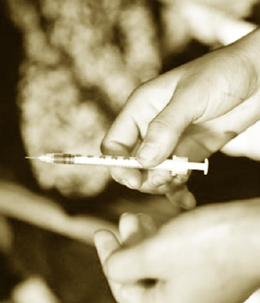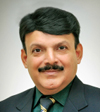Some take drugs because they are Depressed, others are depressed because they take drugs
Some take drugs because they are Depressed, others are depressed because they take drugs
Mangalore Today News Network
By Dr G Shreekumar Menon Mangaluru, Dec 1, 2020: Drug abuse is one of the major problems confronting the nation today especially among the youth. Incidences of drug and alcohol abuse and related anti-social behaviour have tremendously increased in recent years. This has become a matter of concern to the government, parents, teachers, non-governmental organisations and all enforcement agencies. It is more prevalent than parents suspect. Parents do not recognise the extent of drug use and as a result, some young people think they can use drugs with impunity. Most parents believe that it is the responsibility of teachers to check drug abuse among school going children and still most of them delude themselves that their children are safe and secure. Drug abuse is not confined to young people in certain geographical areas or from particular social-economic backgrounds. It affects the nation as a whole-both urban and rural areas. The problem cuts across class. It is not only in slums or low income areas where people are poor and unhappy but also among rich families, movie stars, fashion models and celebrities.The past few decades has seen drugs and drug abuse soar to an extent that it now cuts across all sectors of life.
Mangaluru, Dec 1, 2020: Drug abuse is one of the major problems confronting the nation today especially among the youth. Incidences of drug and alcohol abuse and related anti-social behaviour have tremendously increased in recent years. This has become a matter of concern to the government, parents, teachers, non-governmental organisations and all enforcement agencies. It is more prevalent than parents suspect. Parents do not recognise the extent of drug use and as a result, some young people think they can use drugs with impunity. Most parents believe that it is the responsibility of teachers to check drug abuse among school going children and still most of them delude themselves that their children are safe and secure. Drug abuse is not confined to young people in certain geographical areas or from particular social-economic backgrounds. It affects the nation as a whole-both urban and rural areas. The problem cuts across class. It is not only in slums or low income areas where people are poor and unhappy but also among rich families, movie stars, fashion models and celebrities.The past few decades has seen drugs and drug abuse soar to an extent that it now cuts across all sectors of life.
The level of drug abuse is startling and even more frightening because of the fact that many young people are getting wired on drugs each passing day. Alcohol, bhang and tobacco are increasingly being abused by school going children. A few years ago the most commonly abused drugs among students were tobacco, alcohol, andbhang but today opium, cocaine and heroin have added to the list. Use of sleeping pills, tranquiller, cough mixture, inhalants such as glue and petrol is now rampant especially among youth. Drugs are a craze among the youth and are available everywhere, anytime, in kiosks, bars, social gatherings and over the counter. They are available in every street corner, sold by the street people and other specialised gangs.

Drugs is a lucrative industry run by ruthless cartels who rake crores of rupees from the business annually. It is a complex syndicate woven by powerful people who have enlisted the services of the high and mighty. Corruption abounds everywhere making eradication of drugs a herculean task. Although trafficking of drugs is controlled by adults, the immediate source of drugs for the youth are other youth. Students are supplied with drugs by fellow students.
When we say ‘Drug Abuse’it means the chronic use of a drug for a reason other than for which it was intended. It is the bad use of a drug, for example tobacco, cannabis, heroin, and cocaine.
By saying ‘Drug misuse’it implies using a drug for a reason other than its clinical purpose. When a person starts taking drugs regularly, the drugs produce tolerance, addiction, withdrawals and psychological dependence.
Drug abuse has no single cause. It is generally believed that Peer influence is one of the causes of drug abuse among the youth. Many youngsters are pulled into drugs by those they associate with. It is learnt from those already involved in the habit of drug consumption. Bandura and Walter developed a “social learning theory” of personality which supports this fact. To them, this theory is based on the premise that behaviour is learned and personality can be explained in terms of cumulative effects of a series of learning experiences. The same observation was made by Edwin H. Sutherland and Donald R. Cressey in their “Differential Association Theory”. They formulated the theory in such a way as to show how and otherwise an obedient person through stages of successive events begins to engage in deviant or anti-social behaviour. The theory shows how deviant behaviour is learnt without much biological and psychological impediments.  Impersonal agencies of communication such as movies, television, radios and newspapers play an important role in the genesis of antisocial behaviour. Drug abuse as a form of anti-social behaviour can be imbibed from these media. According to the social control theory, the weakening of the social controls allows the youth to getentangledin the web of drugs. With rapid industrialisation, urbanisation and increased movements to urban areas, new ways of life have been ushered in and new values have replaced the old ones, thereby, creating conditions under which behaviour can be variously defined. Age-old taboos and traditional social control mechanisms have ceased to have force, opening the door to permissiveness that has led the youth to indulge in antisocial behaviour including drug abuse. Parents are no longer in the firm position to direct and guide their children. Some of the youth live far away from their parents, either in school or other learning institutions or may be working. Lack of parental care due to the working situations of the mother or both parents and the disintegration of joint family system have tended to encourage lots of vices. The child’s relationship with the parents especially the mother is very important in its development as it shapes the child’s future behaviour. The children according to the socialisation theory need both parents to grow up as a normal law abiding youth. Broken homes have caused or increased the percentage of youngsters involving in drug abuse. But more distractive than the broken homes are a child’s growth where parent live together in an atmosphere of tension and unhappiness. Frustrations and emotional stress due to failures, and sorrows can also lead people to drug abuse.
Impersonal agencies of communication such as movies, television, radios and newspapers play an important role in the genesis of antisocial behaviour. Drug abuse as a form of anti-social behaviour can be imbibed from these media. According to the social control theory, the weakening of the social controls allows the youth to getentangledin the web of drugs. With rapid industrialisation, urbanisation and increased movements to urban areas, new ways of life have been ushered in and new values have replaced the old ones, thereby, creating conditions under which behaviour can be variously defined. Age-old taboos and traditional social control mechanisms have ceased to have force, opening the door to permissiveness that has led the youth to indulge in antisocial behaviour including drug abuse. Parents are no longer in the firm position to direct and guide their children. Some of the youth live far away from their parents, either in school or other learning institutions or may be working. Lack of parental care due to the working situations of the mother or both parents and the disintegration of joint family system have tended to encourage lots of vices. The child’s relationship with the parents especially the mother is very important in its development as it shapes the child’s future behaviour. The children according to the socialisation theory need both parents to grow up as a normal law abiding youth. Broken homes have caused or increased the percentage of youngsters involving in drug abuse. But more distractive than the broken homes are a child’s growth where parent live together in an atmosphere of tension and unhappiness. Frustrations and emotional stress due to failures, and sorrows can also lead people to drug abuse.
Robert Merton’s theory of the anti-social behaviour emphasizes that ifan individual finds no avenue towards achievement of his goals he may be compelled to exhibit anti-social behaviour and one way of doing it is through drug addiction. The frustrations experienced may result from conditions at school, home or place of work. Some observers believe that some parents are responsible for their children’s drug abuse by exerting enormous pressure in dictating the career goals of their children even if they are not naturally gifted in the specified areas. Some young people on the other hand, try to match the achievements of family members that may be beyond their ability. When they fail they resort to drugs for emotional stability. Merton talks of differential opportunity causing frustration that drive people into antisocial behaviour. He says that modern societies put a very high premium on material success, the form of wealth, by which education opens the doors to success and status symbols but at the same time the same societies fail to make adequate institutional means for the average person, especially the poor and marginally deprived in lower strata of society, to achieve their cherished goals. Poverty also tends to be a prominentfactor in the lives of manysocial deviants including drug abusers. This is what comes to be called economic explanation of deviant behaviour. Poor economic conditions are worsened when the youth do not see any hope of employment even with education. A sociologist defines this feeling when he states-now with formal education everywhere and for nearly everyone, the relationship between schooling and future work is at best not very direct and at worst completely incomprehensible. Some youngsters do not find any meaningful link between education and means of livelihood.Many youth, therefore, do not have a positive outlook towards life.
It has been suggested that boredom or even fear of it, motivates many youngsters to engage in anti-social behaviour. Drug abuse may therefore be a satisfying form of recreation as it is difficult for the community to substitute an equally thrilling but more pleasurable form of diversion.
Anxieties of adolescence have also led youngsters to exhibit anti-social behaviour including drug abuse as a way of trying to discover. An English Psycho-analyst Dr. Derek Miller has observed “Adolescence is a period of in-adaptation. All adolescents are disturbed”. Sociologists and anthropologists as well as other people have clearly defined the difficulty that adolescents find in a fast changing society. In many societies it is accepted and understood that adolescence is the period when a youngster forms his own identity usually by meaningful conflict with his parents or with that of the older generation. It has been said that adolescence is a period of health hostility on the part of the youngsters who in the process of confronting the adult standards and traditions is discoveringhimself. Dr. Miller says that during this time the youngsters are hostile and deviant behaviour may provide a relaxing solution for him.
Some youths take drugs because of the “Pleasure principle” These young people do not suffer from stress and money is not at all a problem. They come from wellto-do families, have access to smart phones,computer games and bikes and cars at their disposal. Materially they lack nothing. However, they take drugs for thrill, excitement and fun. When drugs are taken over long periodsfor fun and pleasure, addictions sets in.
Another cause of drug abuse is “inadequate personality”. Those in this category cannot cope with problems as they come and so seek refuge in drugs to forget their anxieties. But the problem aggravates as they become hooked to drugs. Some people take drugs because they are depressed while other are depressed because they are taking drugs.

Slum areas in cities and towns are centers of drug consumption and abusebecause of multiple reasons. Slums are said to breed the youngest percentage of drug abusers though the removal of slums in some countries did not lead to reduction in incidences of anti-social behaviour. This is explained by ecological theory applied by Burgees and Park in 1920 to the study of human phenomena in Chicago City and related deviant behaviour to the growth of the city. Deviants were found to come from highly and densely populated areas and especially, from congested estates of the city.
Drug abuse can also be caused by certain psychiatric or mental disorders. Chronic alcoholics get frequently involved in offences like the violation of traffic laws, homicides and crimes of violence. Manic depression psychosis especially at the manic phase drives individuals to drug addiction and peddling. Suggestions have also been made about inherited alcoholism, wherein incidence of intellectual and personality disorders is higher among descendants of alcoholics than the general population. But it is still not a complete and validated theory. In England, Cyril Burt in his book “The Young Delinquent” talks about the criminality of the children of alcoholic parents. He found many cases of delinquent children among alcoholic parents than among non-alcoholic parents.
We should not delude ourselves that there are short, swift or easy solutions to drug abuse problem. As one French social worker pointed out “Any person or any community hoping to change a specific delinquent problem must accept the fact that it is a long thoughtful process, often of discouragement and delay. It is expensive in terms of money, time and effects. It needs hardly be pointed out, however, that the result of delinquency or anti-social behaviour is twice as costly”. The problem of anti-social behaviour is for the whole nation and should not be left to a few institutions like schools, police and courts and professionals like psychologists, psychiatrics and social workers.
The association between depression, anxiety and illicit drug abuse is very complex and vast. The present highly competitive and pressurized academic and employment fields can coerce many weak minded individuals to experiment with drugs and thereafter unwittingly become addicted to all kinds of intoxicating substances. Present day societal conditions make many people easily vulnerable to depression, anxiety and negative outlook which affects their academic, personal and professional development. Corrective steps need to be taken at the national and state level to preserve the integrity of society and protect upcoming generations.
 Dr. G. Shreekumar Menon IRS (Rtd) Ph.D: Former Director General of National Academy of Customs Indirect Taxes and Narcotics & Multi-Disciplinary School Of Economic Intelligence India; Fellow, James Martin Centre For Non Proliferation Studies, USA; Fellow, Centre for International Trade & Security, University of Georgia, USA; Public Administration, Maxwell School of Public Administration, Syracuse University, U.S.A.; AOTS Scholar, Japan. He can be contacted at shreemenon48@gmail.com
Dr. G. Shreekumar Menon IRS (Rtd) Ph.D: Former Director General of National Academy of Customs Indirect Taxes and Narcotics & Multi-Disciplinary School Of Economic Intelligence India; Fellow, James Martin Centre For Non Proliferation Studies, USA; Fellow, Centre for International Trade & Security, University of Georgia, USA; Public Administration, Maxwell School of Public Administration, Syracuse University, U.S.A.; AOTS Scholar, Japan. He can be contacted at shreemenon48@gmail.com
- A Breathalyser for Drugs
- Budget 2026: High Stakes, Global Headwinds and Big Domestic Bets
- India’s Court Backlogs Keep Drug Lords On The Streets
- Rethinking Drug Seizure Coverage: A Call for Health-Centred Narratives
- Substance abuse - A pressing concern among medical students
- China is winning the trade war without fighting
- Poll promises can become political nightmares
- While India sticks to death by hanging other execution methods vary across the world
- Spiking of drinks, a grave threat for students’ security
- Burden of drugs and substance use among university students in India
- Mangalore medic’s miracle in Bombay 1957
- Needed a national protocol for treatment of substance use disorders
- The Lingering Menace of Drug Abuse Among the Indian Youth—It’s Time for Action
- Kashmir Bhavan in Bengaluru: A must visit place
- "MAI and I" Book of Angelic Emotions
- Draupadi Murmu - The New ’President of India’
- Anthony Ashram in the city grows a classic museum
- First College of Fisheries in India - A Golden Jubilarian
- Flushing Meadows - A Vintage Mansion
- The Colonel�s Bequest
- A Mangalorean PM and his RBI Governor Brother: The Extraordinary story of the Benegal Brothers
- There is no higher religion than Truth: Theosophical Society
- L�affaire - Ashu & Yiju of Mangalore
- Mangalore in Kowloon
- 1568 to 2018 AD: 450 years of Christianity in Mangaluru
- Vice President elect Naidu moves on from nadir to zenith, the phenomenal journey
- Embracing the Outdoors: How Heated Jackets Are Revolutionizing Cold Weather Activities
- Efficient and Sustainable Packaging Solutions with FIBCs
- The Hybrid Kilt Revolution | Where Tradition Gets Trendy
- Affordable Elegance | Embrace Style on a Budget with Cheap Kilts
- Unleashing Style and Functionality | Exploring Tactical Kilts
- Mangalore’s Heroic Lady marks 105th Birthday
- Santa the Christmas spirit
- Geriatric care: Mangalore strikes a fine balance
- The Don Who Made Two Empires to Clash
- CHITRAPUR SARASWATS - A Great Kanara Community
- Our new President Ram Nath Kovind’s significant journey to Rashtrapathi Bhavan
- Marriages made in heaven, big fat weddings made in India
- Eid insight - The giver of glad tidings
| Comments on this Article | |
| Phirdose, Mangalore | Wed, December-2-2020, 7:51 |
| Excellent article Sir ! Need of the hour ! | |
- CITY INFORMATION
- TRAVEL
- TOURIST INFORMATION
- HEALTH CARE
- MISCELLANEOUS




 Write Comment
Write Comment E-Mail To a Friend
E-Mail To a Friend Facebook
Facebook Twitter
Twitter  Print
Print 


